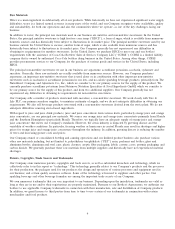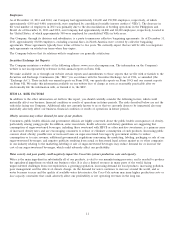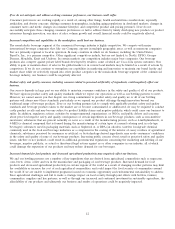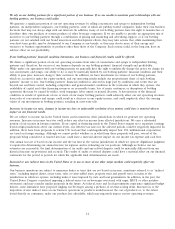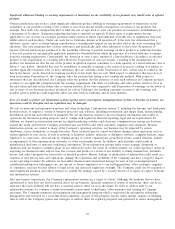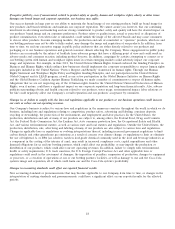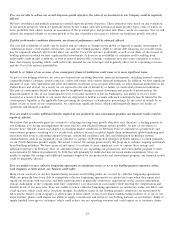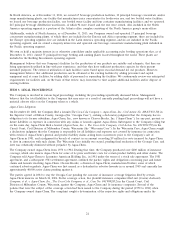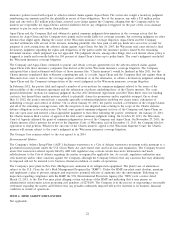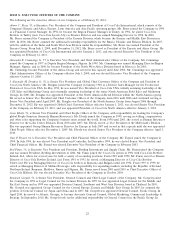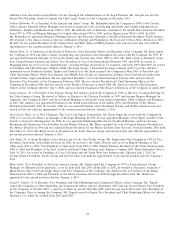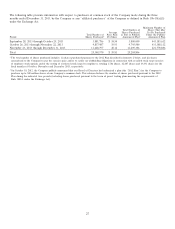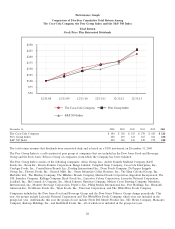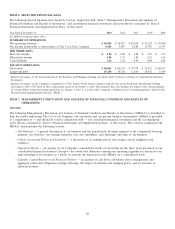Coca Cola 2013 Annual Report Download - page 21
Download and view the complete annual report
Please find page 21 of the 2013 Coca Cola annual report below. You can navigate through the pages in the report by either clicking on the pages listed below, or by using the keyword search tool below to find specific information within the annual report.If we are not able to achieve our overall long-term growth objectives, the value of an investment in our Company could be negatively
affected.
We have established and publicly announced certain long-term growth objectives. These objectives were based on our evaluation
of our growth prospects, which are generally driven by the volume and sales potential of many product types, some of which are
more profitable than others, and on an assessment of the potential price and product mix. There can be no assurance that we will
achieve the required volume or revenue growth or the mix of products necessary to achieve our long-term growth objectives.
If global credit market conditions deteriorate, our financial performance could be adversely affected.
The cost and availability of credit vary by market and are subject to changes in the global or regional economic environment. If
conditions in major credit markets deteriorate, our and our bottling partners’ ability to obtain debt financing on favorable terms
may be negatively affected, which could affect our and the Coca-Cola system’s profitability as well as our share of the income of
bottling partners in which we have equity method investments. A decrease in availability of consumer credit resulting from
unfavorable credit market conditions, as well as general unfavorable economic conditions, may also cause consumers to reduce
their discretionary spending, which could reduce the demand for our beverages and negatively affect our net operating revenues
and the Coca-Cola system’s profitability.
Default by or failure of one or more of our counterparty financial institutions could cause us to incur significant losses.
As part of our hedging activities, we enter into transactions involving derivative financial instruments, including forward contracts,
commodity futures contracts, option contracts, collars and swaps, with various financial institutions. In addition, we have significant
amounts of cash, cash equivalents and other investments on deposit or in accounts with banks or other financial institutions in the
United States and abroad. As a result, we are exposed to the risk of default by or failure of counterparty financial institutions.
The risk of counterparty default or failure may be heightened during economic downturns and periods of uncertainty in the
financial markets. If one of our counterparties were to become insolvent or file for bankruptcy, our ability to recover losses
incurred as a result of default or our assets that are deposited or held in accounts with such counterparty may be limited by the
counterparty’s liquidity or the applicable laws governing the insolvency or bankruptcy proceedings. In the event of default by or
failure of one or more of our counterparties, we could incur significant losses, which could negatively impact our results of
operations and financial condition.
If we are unable to realize additional benefits targeted by our productivity and reinvestment program, our financial results could be
negatively affected.
We believe that productivity gains are essential to achieving our long-term growth objectives and, therefore, a leading priority of
our Company is to design and implement the most effective and efficient business system possible. As part of our efforts to
become more efficient, leaner and adaptive to changing market conditions, in February 2012 we announced a productivity and
reinvestment program consisting of (1) a productivity initiative focused on global supply chain optimization, global marketing and
innovation effectiveness, operating expense leverage, operational excellence and data and information technology systems
standardization; and (2) an expansion of our initiative to capture CCR integration synergies in North America, focused primarily
on our North American product supply. We intend to invest the savings generated by this program to enhance ongoing systemwide
brand-building initiatives. We have incurred and expect to continue to incur significant costs to capture these savings and
additional synergies. In February 2014, we announced that we are expanding our productivity and reinvestment program to drive
an incremental $1 billion in productivity by 2016 that will primarily be redirected into increased media investments. If we are
unable to capture the savings and additional synergies targeted by our productivity and reinvestment program, our financial results
could be negatively affected.
If we are unable to renew collective bargaining agreements on satisfactory terms, or we or our bottling partners experience strikes,
work stoppages or labor unrest, our business could suffer.
Many of our associates at our key manufacturing locations and bottling plants are covered by collective bargaining agreements.
While we generally have been able to renegotiate collective bargaining agreements on satisfactory terms when they expire and
regard our relations with associates and their representatives as generally satisfactory, negotiations in the current environment
remain challenging, as the Company must have competitive cost structures in each market while meeting the compensation and
benefits needs of our associates. If we are unable to renew collective bargaining agreements on satisfactory terms, our labor costs
could increase, which could affect our profit margins. In addition, many of our bottling partners’ employees are represented by
labor unions. Strikes, work stoppages or other forms of labor unrest at any of our major manufacturing facilities or at our or our
major bottlers’ plants could impair our ability to supply concentrates and syrups to our bottling partners or our bottlers’ ability to
supply finished beverages to customers, which could reduce our net operating revenues and could expose us to customer claims.
19


